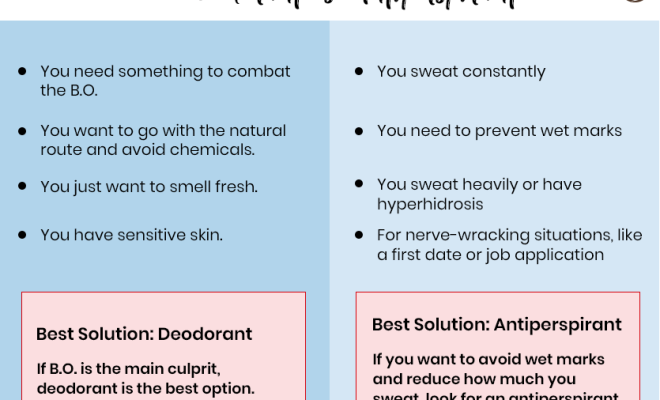Antiperspirant vs. Deodorant: How to choose the best option for you

Sweating is a natural bodily function that helps regulate our core temperature and release toxins. However, sweat can also lead to odors, which is where antiperspirants and deodorants come in. But, how do you know which one is right for you? In this article, we will explore the differences between antiperspirants and deodorants and help you make the best choice for your needs.
Antiperspirants: Fight Sweat and Odors
Antiperspirants aim to reduce sweating and its associated odors by blocking sweat ducts. They contain aluminum-based compounds that interact with sweat glands and form a gel-like substance, temporarily reducing sweat production.
Pros:
1. Effective at reducing excessive sweating
2. Minimizes underarm wetness
3. Reduces odor by limiting bacteria-feeding sweat
Cons:
1. Can cause skin irritation or clog pores in sensitive individuals
2. May contribute to clothing stains
3. Potential concerns about aluminum exposure (although studies have not proven a direct risk)
Deodorants: Mask or Neutralize Odor
Deodorants work differently from antiperspirants; their primary function is to mask or neutralize body odor rather than limit sweating itself. They often contain fragrance or essential oils to cover unpleasant smells, as well as antibacterial agents to combat odor-causing bacteria that thrive in
damp environments.
Pros:
1. Reduces odor without blocking natural perspiration
2. Generally considered less likely to cause skin irritation or clogged pores
3. Many natural and aluminum-free options available
Cons:
1. Does not prevent excessive sweating
2. May require more frequent reapplication compared to some antiperspirant products
Choosing the Best Option for You
When deciding between an antiperspirant and a deodorant, there are a few factors to consider:
1. Sweat levels: If you experience excessive sweating, an antiperspirant may be the more effective choice in controlling both wetness and odor.
2. Skin sensitivity: Deodorants without aluminum compounds might be a better option if you have sensitive skin or are prone to irritation or clogged pores.
3. Ingredient preferences: If avoiding certain ingredients such as synthetic fragrances, parabens, or aluminum compounds is important to you, seek out deodorants that feature natural and organic ingredients.
4. Odor concerns: If body odor is your primary concern and you aren’t as worried about wetness, deodorants could fit the bill perfectly.
Ultimately, what works best for you may require some trial and error. Don’t be afraid to experiment with different brands and formulations until you find the antiperspirant or deodorant that addresses your unique needs and preferences. Remember, our bodies are different, and there isn’t a one-size-fits-all solution when it comes to personal hygiene products.






